Cognitive Behavioural Therapy: Overview, Application and Analysis
VerifiedAdded on 2022/09/11
|6
|1579
|31
Essay
AI Summary
This essay delves into the core principles and applications of Cognitive Behavioral Therapy (CBT). It begins with an introduction to CBT as a goal-oriented psychotherapy approach, highlighting its effectiveness in addressing various mental health challenges, including depression, anxiety, and substance abuse. The discussion explores CBT's evolution, case conceptualization, and its integration of cognitive and behavioral techniques. The essay examines how CBT helps individuals modify thought patterns, manage emotions, and develop coping strategies. It also covers the role of therapists in guiding clients, recognizing high-risk situations, and improving interpersonal skills. The conclusion emphasizes CBT's importance in promoting mental well-being, reducing negative behaviors, and fostering a positive mindset through cognitive interventions and behavioral experiments. It provides an analysis of the therapy and its importance in modern psychology.
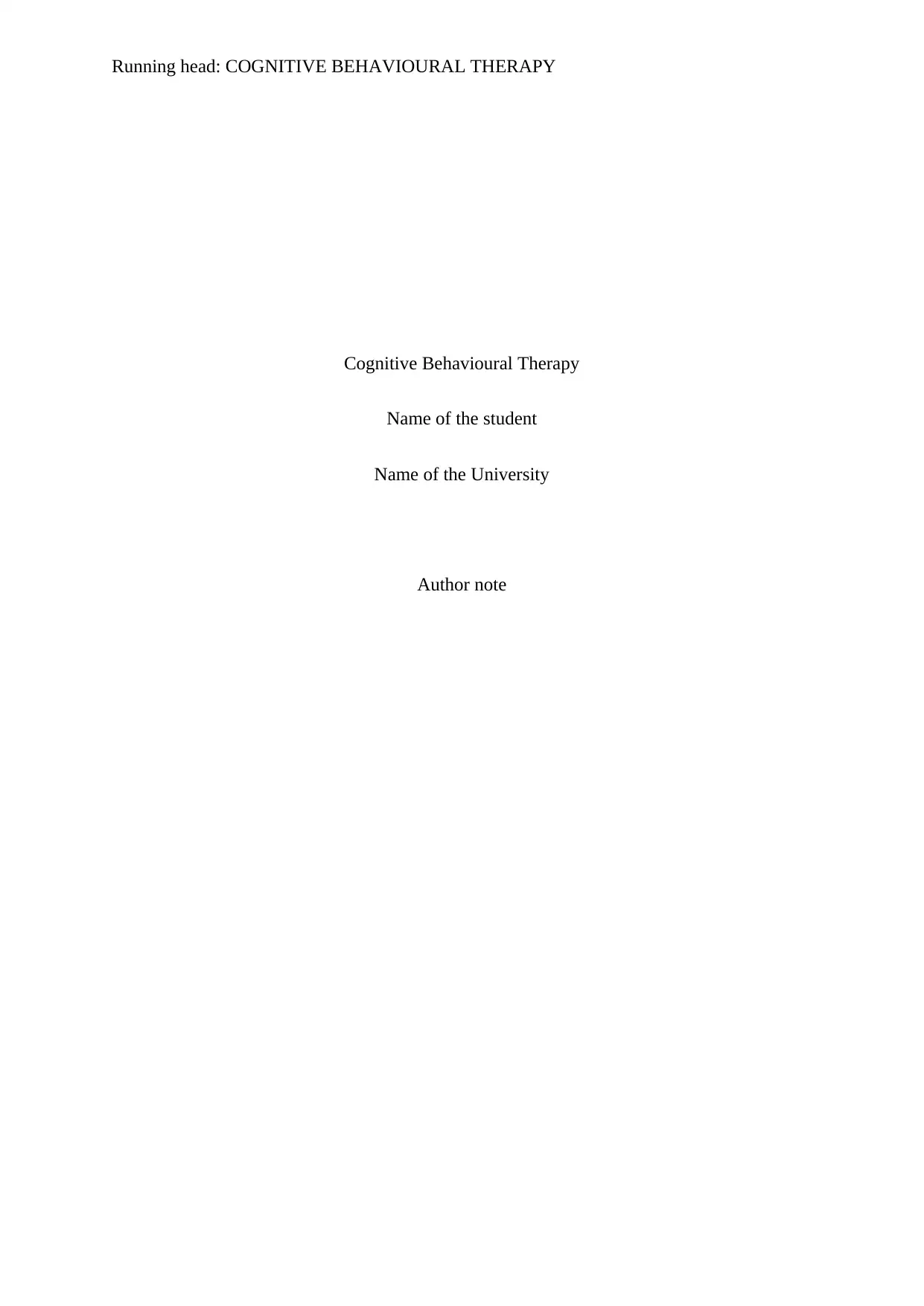
Running head: COGNITIVE BEHAVIOURAL THERAPY
Cognitive Behavioural Therapy
Name of the student
Name of the University
Author note
Cognitive Behavioural Therapy
Name of the student
Name of the University
Author note
Paraphrase This Document
Need a fresh take? Get an instant paraphrase of this document with our AI Paraphraser
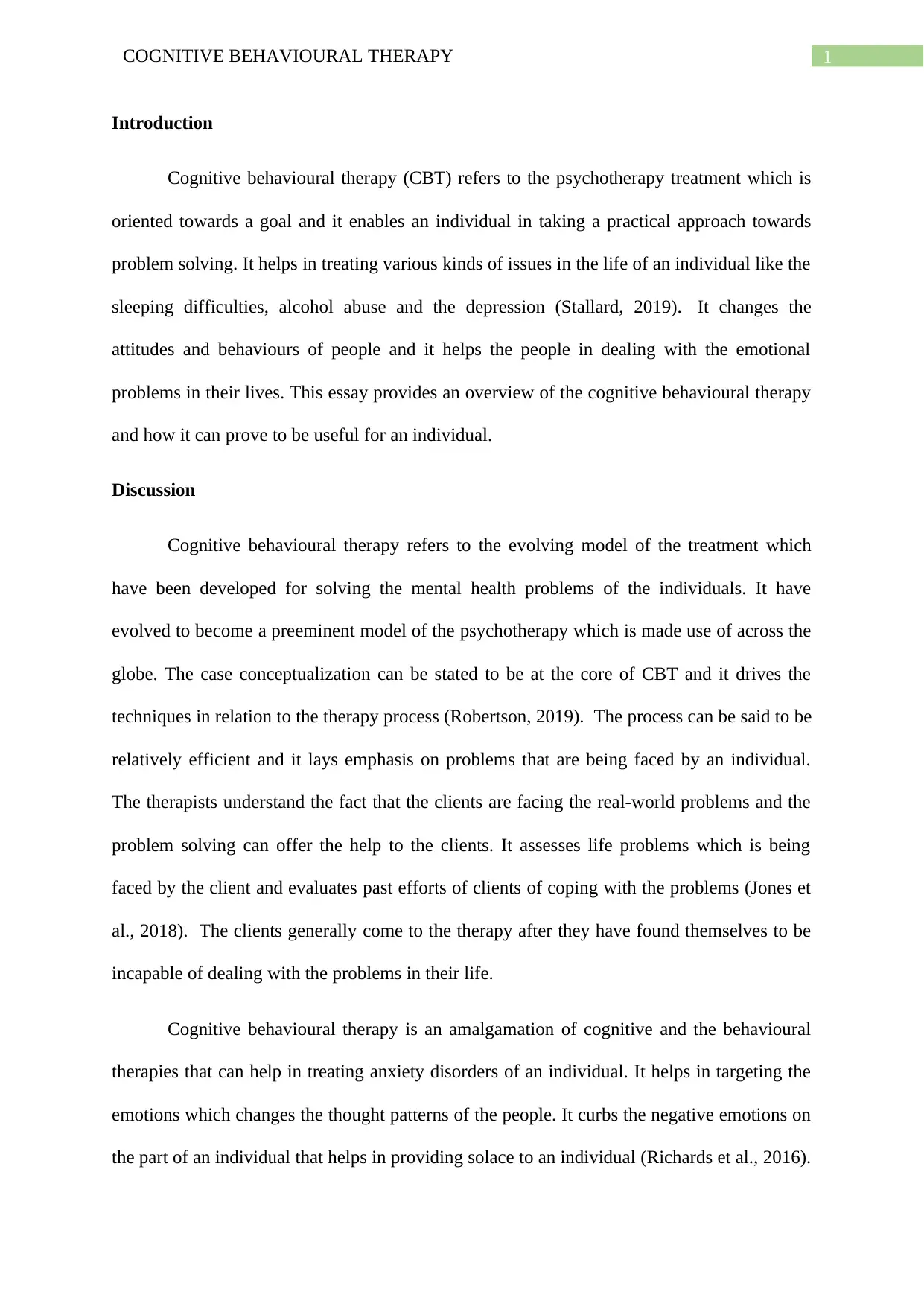
1COGNITIVE BEHAVIOURAL THERAPY
Introduction
Cognitive behavioural therapy (CBT) refers to the psychotherapy treatment which is
oriented towards a goal and it enables an individual in taking a practical approach towards
problem solving. It helps in treating various kinds of issues in the life of an individual like the
sleeping difficulties, alcohol abuse and the depression (Stallard, 2019). It changes the
attitudes and behaviours of people and it helps the people in dealing with the emotional
problems in their lives. This essay provides an overview of the cognitive behavioural therapy
and how it can prove to be useful for an individual.
Discussion
Cognitive behavioural therapy refers to the evolving model of the treatment which
have been developed for solving the mental health problems of the individuals. It have
evolved to become a preeminent model of the psychotherapy which is made use of across the
globe. The case conceptualization can be stated to be at the core of CBT and it drives the
techniques in relation to the therapy process (Robertson, 2019). The process can be said to be
relatively efficient and it lays emphasis on problems that are being faced by an individual.
The therapists understand the fact that the clients are facing the real-world problems and the
problem solving can offer the help to the clients. It assesses life problems which is being
faced by the client and evaluates past efforts of clients of coping with the problems (Jones et
al., 2018). The clients generally come to the therapy after they have found themselves to be
incapable of dealing with the problems in their life.
Cognitive behavioural therapy is an amalgamation of cognitive and the behavioural
therapies that can help in treating anxiety disorders of an individual. It helps in targeting the
emotions which changes the thought patterns of the people. It curbs the negative emotions on
the part of an individual that helps in providing solace to an individual (Richards et al., 2016).
Introduction
Cognitive behavioural therapy (CBT) refers to the psychotherapy treatment which is
oriented towards a goal and it enables an individual in taking a practical approach towards
problem solving. It helps in treating various kinds of issues in the life of an individual like the
sleeping difficulties, alcohol abuse and the depression (Stallard, 2019). It changes the
attitudes and behaviours of people and it helps the people in dealing with the emotional
problems in their lives. This essay provides an overview of the cognitive behavioural therapy
and how it can prove to be useful for an individual.
Discussion
Cognitive behavioural therapy refers to the evolving model of the treatment which
have been developed for solving the mental health problems of the individuals. It have
evolved to become a preeminent model of the psychotherapy which is made use of across the
globe. The case conceptualization can be stated to be at the core of CBT and it drives the
techniques in relation to the therapy process (Robertson, 2019). The process can be said to be
relatively efficient and it lays emphasis on problems that are being faced by an individual.
The therapists understand the fact that the clients are facing the real-world problems and the
problem solving can offer the help to the clients. It assesses life problems which is being
faced by the client and evaluates past efforts of clients of coping with the problems (Jones et
al., 2018). The clients generally come to the therapy after they have found themselves to be
incapable of dealing with the problems in their life.
Cognitive behavioural therapy is an amalgamation of cognitive and the behavioural
therapies that can help in treating anxiety disorders of an individual. It helps in targeting the
emotions which changes the thought patterns of the people. It curbs the negative emotions on
the part of an individual that helps in providing solace to an individual (Richards et al., 2016).
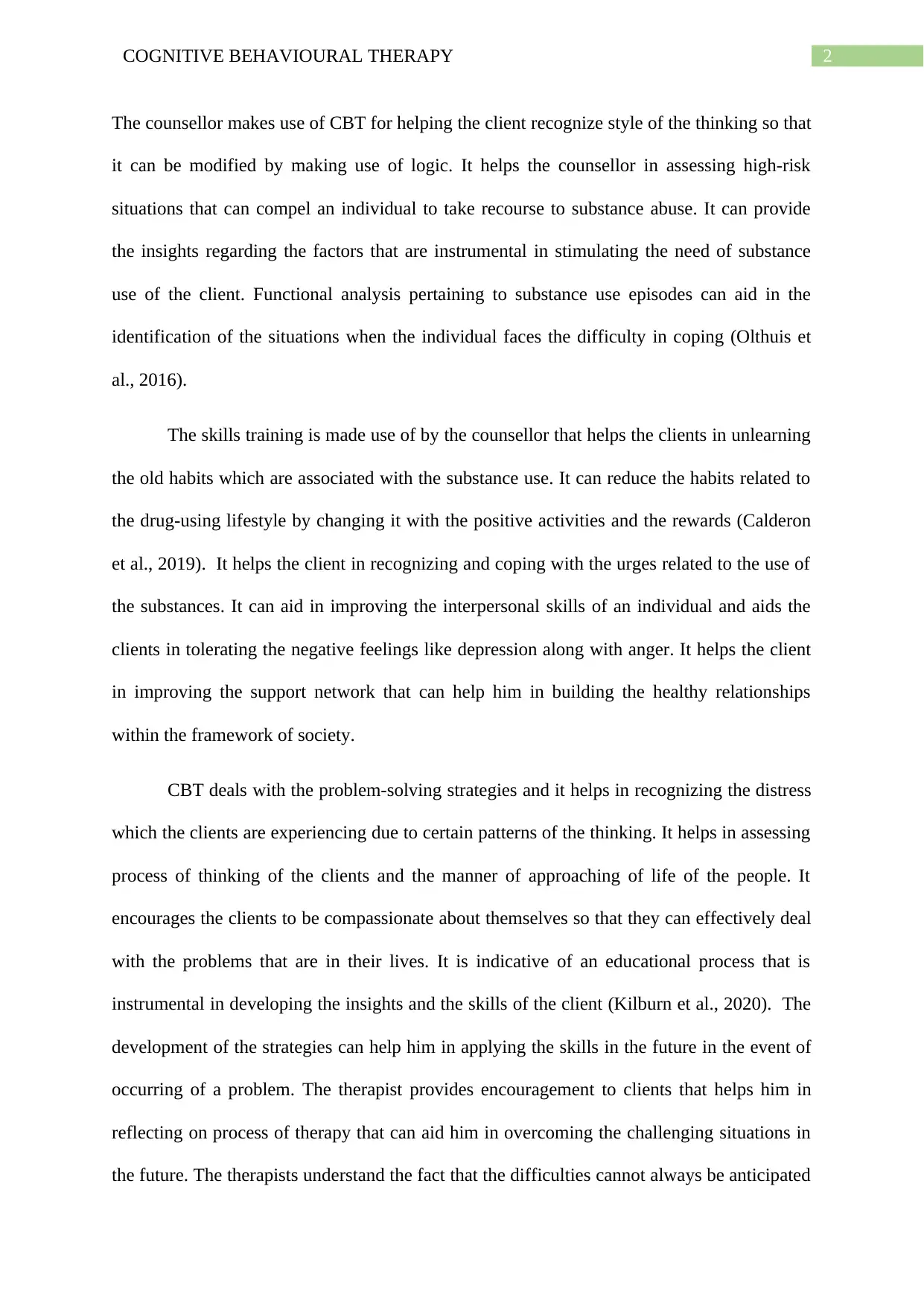
2COGNITIVE BEHAVIOURAL THERAPY
The counsellor makes use of CBT for helping the client recognize style of the thinking so that
it can be modified by making use of logic. It helps the counsellor in assessing high-risk
situations that can compel an individual to take recourse to substance abuse. It can provide
the insights regarding the factors that are instrumental in stimulating the need of substance
use of the client. Functional analysis pertaining to substance use episodes can aid in the
identification of the situations when the individual faces the difficulty in coping (Olthuis et
al., 2016).
The skills training is made use of by the counsellor that helps the clients in unlearning
the old habits which are associated with the substance use. It can reduce the habits related to
the drug-using lifestyle by changing it with the positive activities and the rewards (Calderon
et al., 2019). It helps the client in recognizing and coping with the urges related to the use of
the substances. It can aid in improving the interpersonal skills of an individual and aids the
clients in tolerating the negative feelings like depression along with anger. It helps the client
in improving the support network that can help him in building the healthy relationships
within the framework of society.
CBT deals with the problem-solving strategies and it helps in recognizing the distress
which the clients are experiencing due to certain patterns of the thinking. It helps in assessing
process of thinking of the clients and the manner of approaching of life of the people. It
encourages the clients to be compassionate about themselves so that they can effectively deal
with the problems that are in their lives. It is indicative of an educational process that is
instrumental in developing the insights and the skills of the client (Kilburn et al., 2020). The
development of the strategies can help him in applying the skills in the future in the event of
occurring of a problem. The therapist provides encouragement to clients that helps him in
reflecting on process of therapy that can aid him in overcoming the challenging situations in
the future. The therapists understand the fact that the difficulties cannot always be anticipated
The counsellor makes use of CBT for helping the client recognize style of the thinking so that
it can be modified by making use of logic. It helps the counsellor in assessing high-risk
situations that can compel an individual to take recourse to substance abuse. It can provide
the insights regarding the factors that are instrumental in stimulating the need of substance
use of the client. Functional analysis pertaining to substance use episodes can aid in the
identification of the situations when the individual faces the difficulty in coping (Olthuis et
al., 2016).
The skills training is made use of by the counsellor that helps the clients in unlearning
the old habits which are associated with the substance use. It can reduce the habits related to
the drug-using lifestyle by changing it with the positive activities and the rewards (Calderon
et al., 2019). It helps the client in recognizing and coping with the urges related to the use of
the substances. It can aid in improving the interpersonal skills of an individual and aids the
clients in tolerating the negative feelings like depression along with anger. It helps the client
in improving the support network that can help him in building the healthy relationships
within the framework of society.
CBT deals with the problem-solving strategies and it helps in recognizing the distress
which the clients are experiencing due to certain patterns of the thinking. It helps in assessing
process of thinking of the clients and the manner of approaching of life of the people. It
encourages the clients to be compassionate about themselves so that they can effectively deal
with the problems that are in their lives. It is indicative of an educational process that is
instrumental in developing the insights and the skills of the client (Kilburn et al., 2020). The
development of the strategies can help him in applying the skills in the future in the event of
occurring of a problem. The therapist provides encouragement to clients that helps him in
reflecting on process of therapy that can aid him in overcoming the challenging situations in
the future. The therapists understand the fact that the difficulties cannot always be anticipated
⊘ This is a preview!⊘
Do you want full access?
Subscribe today to unlock all pages.

Trusted by 1+ million students worldwide
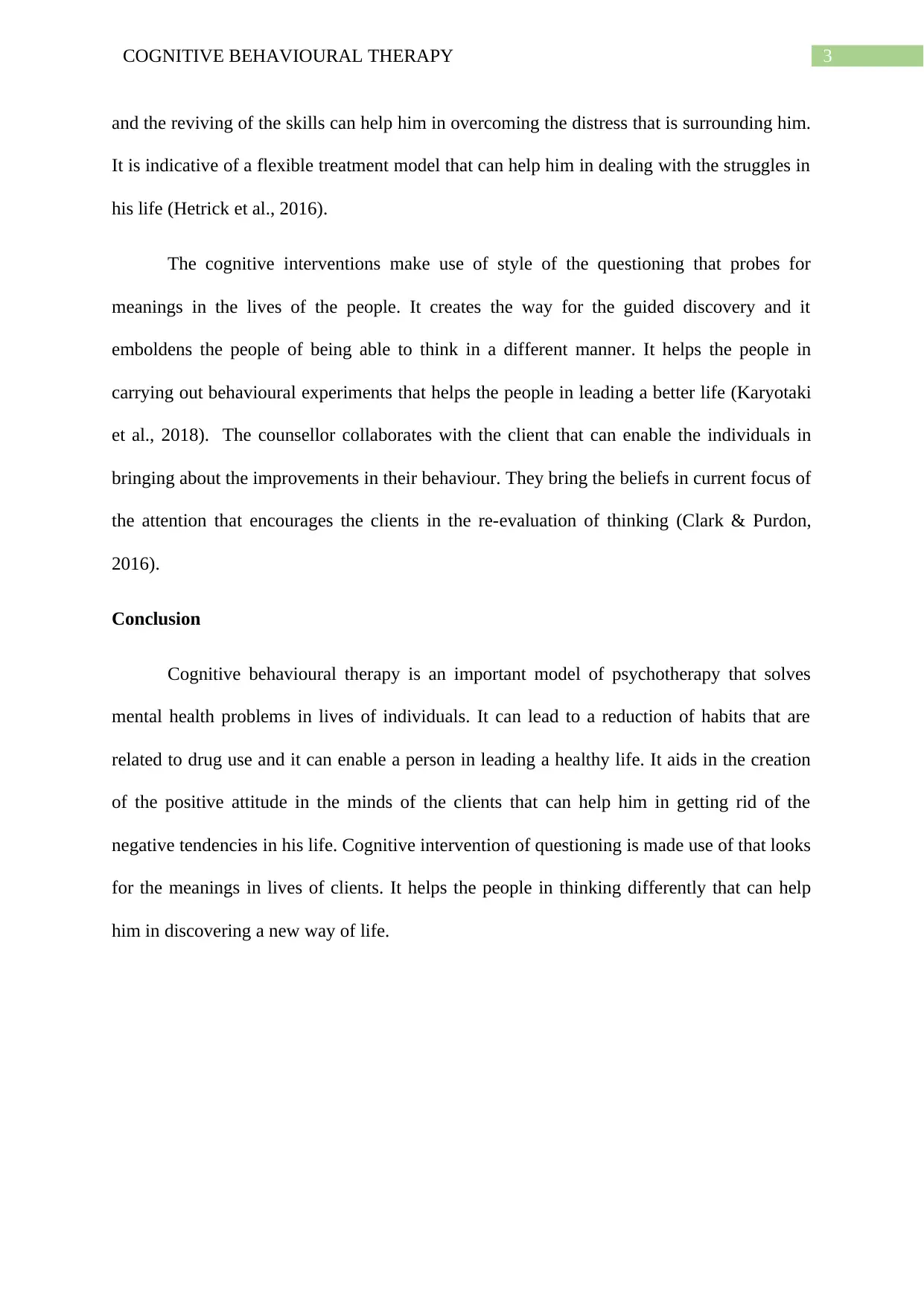
3COGNITIVE BEHAVIOURAL THERAPY
and the reviving of the skills can help him in overcoming the distress that is surrounding him.
It is indicative of a flexible treatment model that can help him in dealing with the struggles in
his life (Hetrick et al., 2016).
The cognitive interventions make use of style of the questioning that probes for
meanings in the lives of the people. It creates the way for the guided discovery and it
emboldens the people of being able to think in a different manner. It helps the people in
carrying out behavioural experiments that helps the people in leading a better life (Karyotaki
et al., 2018). The counsellor collaborates with the client that can enable the individuals in
bringing about the improvements in their behaviour. They bring the beliefs in current focus of
the attention that encourages the clients in the re-evaluation of thinking (Clark & Purdon,
2016).
Conclusion
Cognitive behavioural therapy is an important model of psychotherapy that solves
mental health problems in lives of individuals. It can lead to a reduction of habits that are
related to drug use and it can enable a person in leading a healthy life. It aids in the creation
of the positive attitude in the minds of the clients that can help him in getting rid of the
negative tendencies in his life. Cognitive intervention of questioning is made use of that looks
for the meanings in lives of clients. It helps the people in thinking differently that can help
him in discovering a new way of life.
and the reviving of the skills can help him in overcoming the distress that is surrounding him.
It is indicative of a flexible treatment model that can help him in dealing with the struggles in
his life (Hetrick et al., 2016).
The cognitive interventions make use of style of the questioning that probes for
meanings in the lives of the people. It creates the way for the guided discovery and it
emboldens the people of being able to think in a different manner. It helps the people in
carrying out behavioural experiments that helps the people in leading a better life (Karyotaki
et al., 2018). The counsellor collaborates with the client that can enable the individuals in
bringing about the improvements in their behaviour. They bring the beliefs in current focus of
the attention that encourages the clients in the re-evaluation of thinking (Clark & Purdon,
2016).
Conclusion
Cognitive behavioural therapy is an important model of psychotherapy that solves
mental health problems in lives of individuals. It can lead to a reduction of habits that are
related to drug use and it can enable a person in leading a healthy life. It aids in the creation
of the positive attitude in the minds of the clients that can help him in getting rid of the
negative tendencies in his life. Cognitive intervention of questioning is made use of that looks
for the meanings in lives of clients. It helps the people in thinking differently that can help
him in discovering a new way of life.
Paraphrase This Document
Need a fresh take? Get an instant paraphrase of this document with our AI Paraphraser
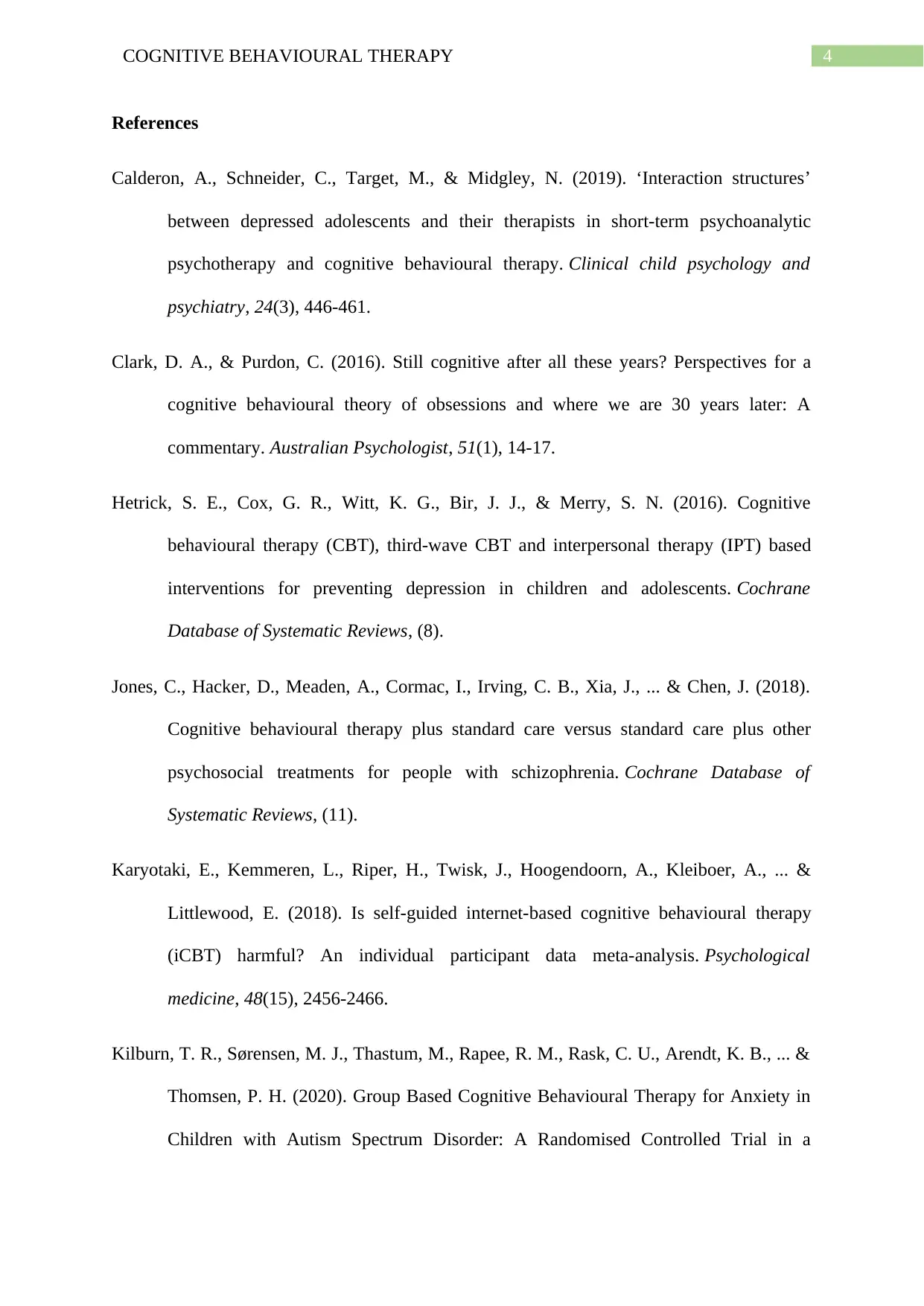
4COGNITIVE BEHAVIOURAL THERAPY
References
Calderon, A., Schneider, C., Target, M., & Midgley, N. (2019). ‘Interaction structures’
between depressed adolescents and their therapists in short-term psychoanalytic
psychotherapy and cognitive behavioural therapy. Clinical child psychology and
psychiatry, 24(3), 446-461.
Clark, D. A., & Purdon, C. (2016). Still cognitive after all these years? Perspectives for a
cognitive behavioural theory of obsessions and where we are 30 years later: A
commentary. Australian Psychologist, 51(1), 14-17.
Hetrick, S. E., Cox, G. R., Witt, K. G., Bir, J. J., & Merry, S. N. (2016). Cognitive
behavioural therapy (CBT), third‐wave CBT and interpersonal therapy (IPT) based
interventions for preventing depression in children and adolescents. Cochrane
Database of Systematic Reviews, (8).
Jones, C., Hacker, D., Meaden, A., Cormac, I., Irving, C. B., Xia, J., ... & Chen, J. (2018).
Cognitive behavioural therapy plus standard care versus standard care plus other
psychosocial treatments for people with schizophrenia. Cochrane Database of
Systematic Reviews, (11).
Karyotaki, E., Kemmeren, L., Riper, H., Twisk, J., Hoogendoorn, A., Kleiboer, A., ... &
Littlewood, E. (2018). Is self-guided internet-based cognitive behavioural therapy
(iCBT) harmful? An individual participant data meta-analysis. Psychological
medicine, 48(15), 2456-2466.
Kilburn, T. R., Sørensen, M. J., Thastum, M., Rapee, R. M., Rask, C. U., Arendt, K. B., ... &
Thomsen, P. H. (2020). Group Based Cognitive Behavioural Therapy for Anxiety in
Children with Autism Spectrum Disorder: A Randomised Controlled Trial in a
References
Calderon, A., Schneider, C., Target, M., & Midgley, N. (2019). ‘Interaction structures’
between depressed adolescents and their therapists in short-term psychoanalytic
psychotherapy and cognitive behavioural therapy. Clinical child psychology and
psychiatry, 24(3), 446-461.
Clark, D. A., & Purdon, C. (2016). Still cognitive after all these years? Perspectives for a
cognitive behavioural theory of obsessions and where we are 30 years later: A
commentary. Australian Psychologist, 51(1), 14-17.
Hetrick, S. E., Cox, G. R., Witt, K. G., Bir, J. J., & Merry, S. N. (2016). Cognitive
behavioural therapy (CBT), third‐wave CBT and interpersonal therapy (IPT) based
interventions for preventing depression in children and adolescents. Cochrane
Database of Systematic Reviews, (8).
Jones, C., Hacker, D., Meaden, A., Cormac, I., Irving, C. B., Xia, J., ... & Chen, J. (2018).
Cognitive behavioural therapy plus standard care versus standard care plus other
psychosocial treatments for people with schizophrenia. Cochrane Database of
Systematic Reviews, (11).
Karyotaki, E., Kemmeren, L., Riper, H., Twisk, J., Hoogendoorn, A., Kleiboer, A., ... &
Littlewood, E. (2018). Is self-guided internet-based cognitive behavioural therapy
(iCBT) harmful? An individual participant data meta-analysis. Psychological
medicine, 48(15), 2456-2466.
Kilburn, T. R., Sørensen, M. J., Thastum, M., Rapee, R. M., Rask, C. U., Arendt, K. B., ... &
Thomsen, P. H. (2020). Group Based Cognitive Behavioural Therapy for Anxiety in
Children with Autism Spectrum Disorder: A Randomised Controlled Trial in a
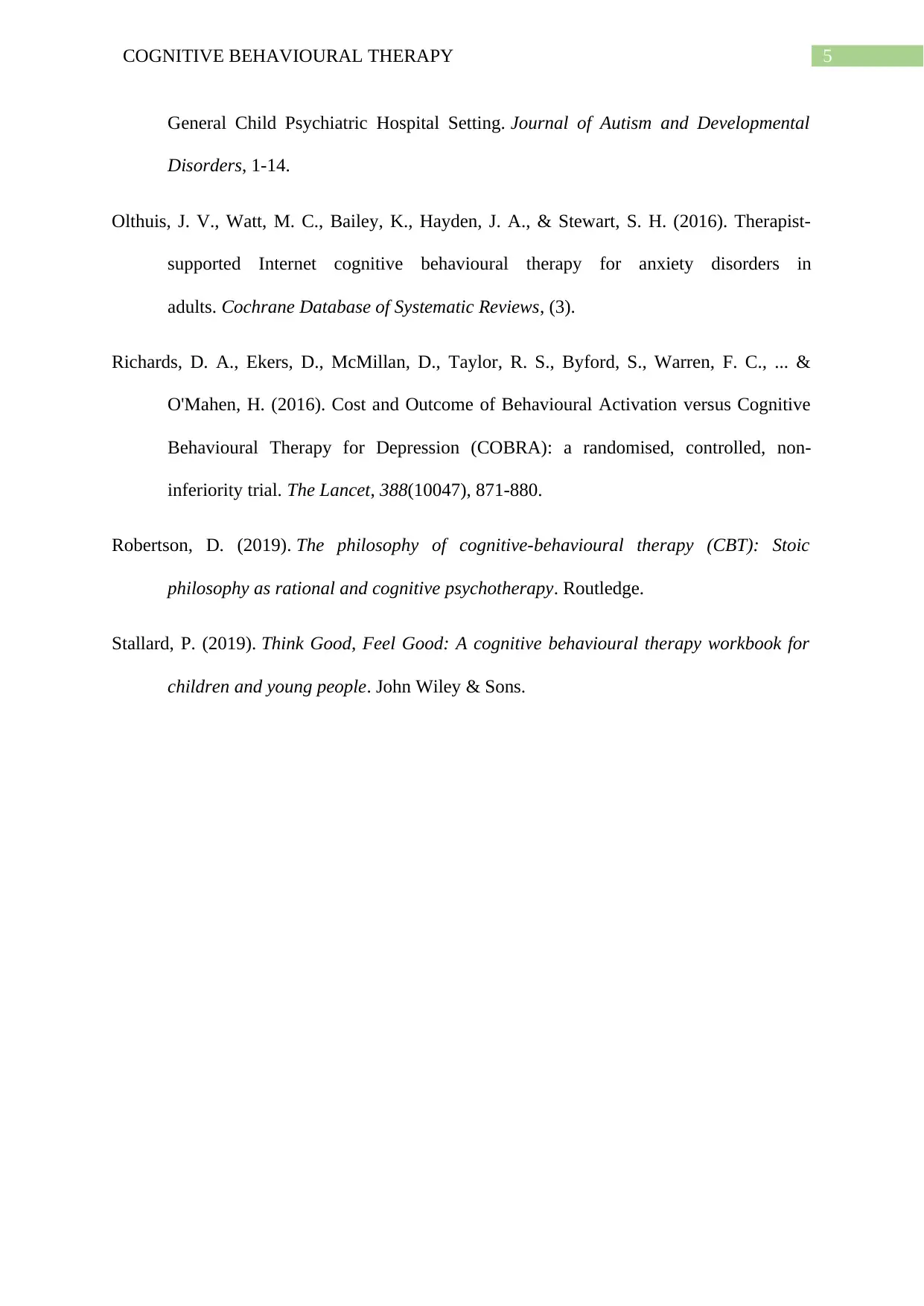
5COGNITIVE BEHAVIOURAL THERAPY
General Child Psychiatric Hospital Setting. Journal of Autism and Developmental
Disorders, 1-14.
Olthuis, J. V., Watt, M. C., Bailey, K., Hayden, J. A., & Stewart, S. H. (2016). Therapist‐
supported Internet cognitive behavioural therapy for anxiety disorders in
adults. Cochrane Database of Systematic Reviews, (3).
Richards, D. A., Ekers, D., McMillan, D., Taylor, R. S., Byford, S., Warren, F. C., ... &
O'Mahen, H. (2016). Cost and Outcome of Behavioural Activation versus Cognitive
Behavioural Therapy for Depression (COBRA): a randomised, controlled, non-
inferiority trial. The Lancet, 388(10047), 871-880.
Robertson, D. (2019). The philosophy of cognitive-behavioural therapy (CBT): Stoic
philosophy as rational and cognitive psychotherapy. Routledge.
Stallard, P. (2019). Think Good, Feel Good: A cognitive behavioural therapy workbook for
children and young people. John Wiley & Sons.
General Child Psychiatric Hospital Setting. Journal of Autism and Developmental
Disorders, 1-14.
Olthuis, J. V., Watt, M. C., Bailey, K., Hayden, J. A., & Stewart, S. H. (2016). Therapist‐
supported Internet cognitive behavioural therapy for anxiety disorders in
adults. Cochrane Database of Systematic Reviews, (3).
Richards, D. A., Ekers, D., McMillan, D., Taylor, R. S., Byford, S., Warren, F. C., ... &
O'Mahen, H. (2016). Cost and Outcome of Behavioural Activation versus Cognitive
Behavioural Therapy for Depression (COBRA): a randomised, controlled, non-
inferiority trial. The Lancet, 388(10047), 871-880.
Robertson, D. (2019). The philosophy of cognitive-behavioural therapy (CBT): Stoic
philosophy as rational and cognitive psychotherapy. Routledge.
Stallard, P. (2019). Think Good, Feel Good: A cognitive behavioural therapy workbook for
children and young people. John Wiley & Sons.
⊘ This is a preview!⊘
Do you want full access?
Subscribe today to unlock all pages.

Trusted by 1+ million students worldwide
1 out of 6
Related Documents
Your All-in-One AI-Powered Toolkit for Academic Success.
+13062052269
info@desklib.com
Available 24*7 on WhatsApp / Email
![[object Object]](/_next/static/media/star-bottom.7253800d.svg)
Unlock your academic potential
Copyright © 2020–2026 A2Z Services. All Rights Reserved. Developed and managed by ZUCOL.





